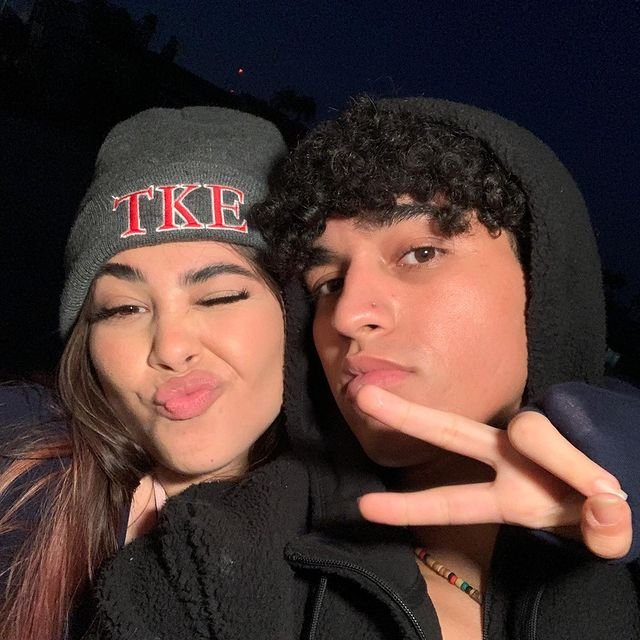It’s no secret that the internet has a way of turning ordinary moments into viral sensations. But when it comes to Bella Retamosa leaked, the conversation takes on a whole new level of intrigue and controversy. In this digital age, where privacy can feel like a distant memory, understanding the context behind such incidents is crucial. So, let’s dive right in and explore what exactly happened, why it matters, and how we can navigate these complex situations responsibly.
You’ve probably seen the headlines or scrolled past the buzz on social media. Bella Retamosa’s name has been making waves, and not just for the reasons she might’ve expected. This isn’t just another viral story; it’s a reminder of the power—and pitfalls—of sharing our lives online. As we unpack the details, we’ll also touch on the importance of respecting privacy and consent in an era where everything seems up for grabs.
Before we jump into the nitty-gritty, let’s set the stage. Bella Retamosa isn’t just a random name thrown into the internet chaos. She’s a real person with a real story, and like any other individual, she deserves respect and understanding. In the sections ahead, we’ll explore everything from the origins of the leak to the broader implications for all of us as digital citizens. So, buckle up—it’s gonna be a ride.
Read also:George Michaels Daughter Death Unveiling The Truth Behind The Tragic Story
Who Is Bella Retamosa? A Quick Bio
Let’s start with the basics. Who exactly is Bella Retamosa? Well, she’s a young woman whose life took an unexpected turn when private content attributed to her began circulating online. While she may not have sought the spotlight, her story has become a focal point for discussions around privacy, consent, and the ethics of sharing personal information without permission.
To give you a clearer picture, here’s a quick rundown:
- Full Name: Bella Retamosa
- Age: Early 20s
- Location: Based in the Philippines, but her story has reached global audiences
- Occupation: Not publicly disclosed, but she’s now inadvertently become a figure of internet fame
But beyond the stats, Bella is a human being whose personal boundaries were crossed in a way that none of us would ever want to experience. Let’s not lose sight of that as we delve deeper into the details.
Bella Retamosa’s Data at a Glance
| Category | Details |
|---|---|
| Full Name | Bella Retamosa |
| Age | Early 20s |
| Location | Philippines |
| Occupation | Not Disclosed |
Understanding the Bella Retamosa Leaked Incident
Alright, let’s talk about the elephant in the room—the Bella Retamosa leaked incident. What exactly happened here? Reports suggest that private content, likely intended for a limited audience, was shared without her consent. This kind of leak isn’t uncommon in today’s world, but that doesn’t make it any less alarming—or any more acceptable.
Think about it: how would you feel if something deeply personal, something you never intended for public consumption, suddenly became the subject of global discussion? It’s not just embarrassing; it’s invasive and violating. The incident highlights a growing issue in our digital landscape—how easy it is for private moments to become public property.
Now, before we go any further, it’s important to emphasize that sharing or consuming leaked content without consent is not just unethical; it’s illegal in many jurisdictions. We’ll dive deeper into the legal aspects later, but for now, just remember this: consent matters. Always.
Read also:Lalah Hathaways Husband The Love Story Behind The Musical Legend
Why Does the Bella Retamosa Leaked Story Matter?
Here’s the thing: Bella Retamosa’s story isn’t just about one person. It’s about all of us. In a world where smartphones and social media dominate our daily lives, the line between private and public has blurred. The Bella Retamosa leaked incident serves as a wake-up call, reminding us of the importance of respecting others’ privacy and understanding the consequences of our actions online.
Let’s break it down:
- Privacy: Everyone has the right to control what they share and with whom. When that control is taken away, it’s a violation of basic human dignity.
- Consent: Sharing someone else’s private content without their permission is not only wrong but also potentially harmful. It can lead to emotional distress, reputational damage, and even legal consequences.
- Accountability: As digital citizens, we have a responsibility to think twice before clicking “share” or “download.” Our actions can have real-world impacts on real people.
So, why does it matter? Because every time we ignore these principles, we contribute to a culture where privacy is undervalued and exploitation is normalized. And that’s not a world any of us should want to live in.
The Legal Implications of Leaked Content
Now, let’s talk about the law. In many countries, sharing or distributing private content without consent is considered a criminal offense. This includes so-called “revenge porn,” which is exactly what it sounds like—intimate images or videos shared with malicious intent. But even if there’s no malice involved, the act of distributing private content without permission can still land you in hot water.
Here’s a quick overview of the legal landscape:
- In the United States, several states have laws specifically addressing revenge porn, making it illegal to distribute explicit images without consent.
- In the Philippines, where Bella Retamosa is based, the Anti-Photo and Video Voyeurism Act of 2009 criminalizes the unauthorized recording, distribution, or possession of intimate images.
- Internationally, organizations like the European Union have implemented strict data protection regulations under the GDPR, which emphasize the importance of consent and privacy.
What does this mean for you? It means that if you’re thinking about sharing or consuming leaked content, think again. Not only could you be contributing to someone’s suffering, but you could also be breaking the law. And no one wants that.
How to Navigate the Digital World Responsibly
So, how do we move forward in a way that respects privacy and promotes accountability? Here are a few tips:
- Think Before You Click: Before sharing or downloading any content, ask yourself if it’s appropriate. If it’s private or intimate, the answer is almost always no.
- Respect Consent: Whether it’s sharing photos, videos, or even text messages, always get explicit permission from the people involved.
- Report Violations: If you come across leaked content that you believe was shared without consent, report it to the platform or authorities. You can make a difference.
- Stay Informed: Keep up with the latest laws and guidelines regarding digital privacy. Knowledge is power, and the more you know, the better equipped you’ll be to navigate the online world responsibly.
By taking these steps, we can all play a role in creating a safer, more respectful digital environment. It’s not just about protecting ourselves; it’s about protecting each other.
Common Misconceptions About Leaked Content
Let’s clear up a few myths about leaked content:
- Myth #1: “If it’s already online, it doesn’t matter if I share it.”
- Reality: Every share contributes to the spread of harmful content and can further harm the person involved.
- Myth #2: “It’s not a big deal if it’s just a picture or a video.”
- Reality: Any private content shared without consent can have serious emotional and legal consequences.
- Myth #3: “It’s just part of internet culture.”
- Reality: Normalizing the sharing of private content without consent perpetuates a culture of exploitation and disrespect.
Don’t fall for these misconceptions. Instead, be part of the solution by promoting respect and accountability online.
The Role of Social Media Platforms
Social media platforms play a crucial role in how leaked content is shared and consumed. While many platforms have policies against non-consensual sharing of intimate content, enforcement can be inconsistent. This creates a challenging environment where harmful content can still spread quickly and widely.
Here’s what platforms can do better:
- Strengthen Policies: Implement clearer guidelines on what constitutes non-consensual sharing and enforce them consistently.
- Improve Reporting Tools: Make it easier for users to report violations and ensure swift action is taken.
- Educate Users: Raise awareness about the importance of consent and the potential consequences of sharing private content.
And here’s what we can do as users:
- Use Platforms Responsibly: Avoid sharing or consuming leaked content, and report any violations you encounter.
- Support Victims: If someone you know is affected by a leak, offer support and encourage them to seek help.
- Stay Informed: Keep up with platform policies and changes, and use your voice to advocate for better protections.
Together, we can push for a digital world that values privacy and respect above all else.
Impact on Mental Health
Let’s not forget the human side of this story. Leaked content can have devastating effects on mental health, leading to anxiety, depression, and even trauma. For Bella Retamosa and others in similar situations, the emotional toll can be overwhelming.
Here’s how it can affect individuals:
- Public Humiliation: Having private moments exposed to the world can be incredibly humiliating and embarrassing.
- Reputation Damage: Leaked content can harm someone’s professional and personal reputation, affecting their relationships and opportunities.
- Emotional Distress: The constant fear of judgment and harassment can lead to long-term emotional distress and even PTSD.
If you or someone you know is affected by a leak, it’s important to seek support. Professional counseling, support groups, and hotlines can provide valuable assistance during these challenging times.
Prevention and Protection
While we can’t control everything that happens online, there are steps we can take to protect ourselves and our loved ones:
- Secure Your Devices: Use strong passwords, enable two-factor authentication, and keep your software up to date.
- Limit Sharing: Be cautious about what you share online and with whom. Trust is key, but even trusted individuals can make mistakes.
- Know Your Rights: Understand the laws and resources available to you in case of a privacy breach.
By taking these precautions, we can reduce the risk of becoming victims of leaks and promote a safer digital environment for everyone.
Conclusion: Taking Action for a Better Digital Future
As we wrap up this exploration of the Bella Retamosa leaked incident, let’s take a moment to reflect. This story is more than just a viral sensation; it’s a call to action. It’s a reminder of the importance of respecting privacy, promoting consent, and holding ourselves accountable for our actions online.
Here’s what we’ve learned:
- Privacy is a fundamental right that deserves protection.
- Consent matters in every context, especially when it comes to sharing personal content.
- Legal consequences can and do exist for those who violate others’ privacy.
- We all have a role to play in creating a safer, more respectful digital world.
So, what’s next? It’s up to you. Will you choose to be part of the problem or part of the solution? Share this article with your friends, family, and followers. Start conversations about digital privacy and consent. And most importantly, remember that behind every screen is a real person with real feelings.
Let’s work together to build a digital future where respect and accountability reign supreme. Because at the end of the day, that’s the kind of world we all deserve.
Table of Contents


